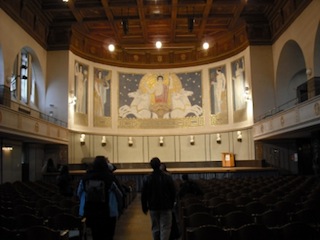Study Abroad Programs -- Interview with Will White

I interviewed Will White, student affairs professional and study abroad enthusiast, about study abroad programs. Mr. White is currently a senior student advisor for Centura College. Previously, he worked for Old Dominion University's study abroad program as an intern leading a study abroad program, and as a graduate assistant advising students on study abroad opportunities and helping them plan for their experiences.

During Mr. White's undergraduate days, he decided to study abroad because he was considering teaching international politics. He spent a semester studying in Copenhagen, Denmark and a summer in Prague, Czech Republic. After his first experience abroad, he was "hooked;" he wanted to share his experience with as many people as possible. After finishing his bachelor's degree in Political Science from the University of North Carolina at Asheville, he went on to complete his Master of Science in Education degree from Old Dominion University, studying the higher education field. His desire to share his study abroad experience with others led him to a new career path: assisting students throughout their college careers.
Mr. White says that there are many benefits to participating in a study abroad program. He explained that that studying in another country not only teaches students to how to interact with people from other cultures, but the experience also teaches them how many aspects of our lives are actually culturally based. Some examples of culturally based behaviors that Mr. White described were the distance one stands from others, the standard conduct of a business meeting, and ways of asking questions. Those who have the ability to interact successfully with people from other cultures, he explained, have an advantage in the job market as companies become more international.
Studying abroad programs teach students to be more self-reliant and become better able to handle change, explained Mr. White. This is because the students are cut off from their traditional ways of doing things and the people on whom they rely. The students studying abroad must be more creative in their problem solving and become more open to alternative solutions.
A great deal of careful planning is necessary before students study abroad. All programs require planning, but longer programs require the most planning. Beyond making travel arrangements, deciding what to pack, and getting a passport, Mr. White explained that students participating in longer programs must select classes that will fulfill requirements of the degree they are seeking, apply for a visa, obtain international health insurance, and more. Although Mr. White acknowledges that preparing to go abroad can be time consuming, he assured us that it is worth the effort.

While language skills are helpful for those living in non-English speaking counties, and may be necessary in some Spanish- and French-speaking countries, Mr. White explained that many universities offer courses taught in English. He further stated that there are study abroad opportunities in English-speaking countries.
Study abroad can be more affordable than many people realize. According to Mr. White, the expenses students incur are often similar to the expenses they incur studying at their home institution. However, costs vary. He explained that programs with greater support typically cost more. He further explained that destinations in Western Europe tend to have associated higher costs; however, the expenses involved for destinations in developing countries are likely to be less than at the students' home institution. In general, students can receive the same aid that they do for study at their home universities. According to Mr. White students, especially those willing to travel to non-traditional locations, sometimes qualify for additional funds to cover their travel and other expenses.
Most universities take a number of precautions to help students studying abroad remain safe. Mr. White said that universities monitor U.S. State Department's travel information, communicate with contacts in the countries where the programs are located, and consult with experts in the field to stay apprised of current conditions. When conditions appear to be unsafe, students are brought back. According to Mr. White, most universities screen living arrangements, work with contacts at the study abroad destinations, communicate with the students to address health and safety concerns, and maintain plans for assisting students in emergencies.
"Make the most out of the experience" is the advice that Mr. White offers to students who are studying abroad. He goes on to say, "No matter where you go, no matter what you study, you will have a life-changing experience. The impact of the experience depends on you."

All images provided by Will White. The rights for each image in this article are retained by him.
During Mr. White's undergraduate days, he decided to study abroad because he was considering teaching international politics. He spent a semester studying in Copenhagen, Denmark and a summer in Prague, Czech Republic. After his first experience abroad, he was "hooked;" he wanted to share his experience with as many people as possible. After finishing his bachelor's degree in Political Science from the University of North Carolina at Asheville, he went on to complete his Master of Science in Education degree from Old Dominion University, studying the higher education field. His desire to share his study abroad experience with others led him to a new career path: assisting students throughout their college careers.
Mr. White says that there are many benefits to participating in a study abroad program. He explained that that studying in another country not only teaches students to how to interact with people from other cultures, but the experience also teaches them how many aspects of our lives are actually culturally based. Some examples of culturally based behaviors that Mr. White described were the distance one stands from others, the standard conduct of a business meeting, and ways of asking questions. Those who have the ability to interact successfully with people from other cultures, he explained, have an advantage in the job market as companies become more international.
Studying abroad programs teach students to be more self-reliant and become better able to handle change, explained Mr. White. This is because the students are cut off from their traditional ways of doing things and the people on whom they rely. The students studying abroad must be more creative in their problem solving and become more open to alternative solutions.
A great deal of careful planning is necessary before students study abroad. All programs require planning, but longer programs require the most planning. Beyond making travel arrangements, deciding what to pack, and getting a passport, Mr. White explained that students participating in longer programs must select classes that will fulfill requirements of the degree they are seeking, apply for a visa, obtain international health insurance, and more. Although Mr. White acknowledges that preparing to go abroad can be time consuming, he assured us that it is worth the effort.
While language skills are helpful for those living in non-English speaking counties, and may be necessary in some Spanish- and French-speaking countries, Mr. White explained that many universities offer courses taught in English. He further stated that there are study abroad opportunities in English-speaking countries.
Study abroad can be more affordable than many people realize. According to Mr. White, the expenses students incur are often similar to the expenses they incur studying at their home institution. However, costs vary. He explained that programs with greater support typically cost more. He further explained that destinations in Western Europe tend to have associated higher costs; however, the expenses involved for destinations in developing countries are likely to be less than at the students' home institution. In general, students can receive the same aid that they do for study at their home universities. According to Mr. White students, especially those willing to travel to non-traditional locations, sometimes qualify for additional funds to cover their travel and other expenses.
Most universities take a number of precautions to help students studying abroad remain safe. Mr. White said that universities monitor U.S. State Department's travel information, communicate with contacts in the countries where the programs are located, and consult with experts in the field to stay apprised of current conditions. When conditions appear to be unsafe, students are brought back. According to Mr. White, most universities screen living arrangements, work with contacts at the study abroad destinations, communicate with the students to address health and safety concerns, and maintain plans for assisting students in emergencies.
"Make the most out of the experience" is the advice that Mr. White offers to students who are studying abroad. He goes on to say, "No matter where you go, no matter what you study, you will have a life-changing experience. The impact of the experience depends on you."
All images provided by Will White. The rights for each image in this article are retained by him.

Related Articles
Editor's Picks Articles
Top Ten Articles
Previous Features
Site Map
Content copyright © 2023 by Susan D. Bates. All rights reserved.
This content was written by Susan D. Bates. If you wish to use this content in any manner, you need written permission. Contact Eliza Morrison Nimmich for details.


